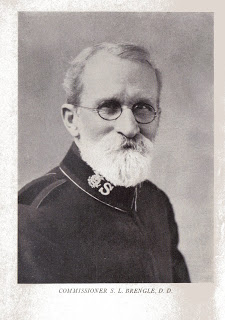Question: "How do you find the time to do all the things we should do as Christians, with all the demands that today's world puts on us?"
We have far more free time at our disposal than most people did in the past. Most people spent the bulk of their time trying to survive. They did not have lots of leisure time, as we do. But just as expenses rise up to meet income, we have found lots of things to waste our time on, and so we do.
Imagine how laborious a process it was just to wash clothes, within living memory. Now we throw our clothes into a washing machine, along with some soap, come back less than an hour later, and throw them into a dryer, and we are done. This once was a task that consumed hours and hours, and was hard and tedious work.
There are a few things that I have found helpful in terms of making good use of my time.
 Samuel Logan Brengle
Samuel Logan Brengle
"See that ye walk circumspect, not as fools, but as wise, redeeming the time, because the days are evil." (Ephesians 5:15-16).
It was focused on time management, and he had two bits of advice that made a strong impression on me:
1). Look for opportunities to make good use of your time:
"If you would save time, have a Bible, a notebook and a pencil always at hand. Never go on to the street or take a journey without at least a Testament with you, and some other useful book if possible. And don't forget to use them. The Gospel of St. Matthew can be read through in two hours. This may not be the most profitable way to read it, and yet it will pay to read it right through at one sitting, that we may see the life of Jesus as a whole as we would the life of any man. Paul's first letter to Timothy can be read in twenty minutes, while Jude can be read in three minutes easily. Then don't throw away these minutes."
Many people insist that they haven't the time to read the Bible, but we have so many opportunities in a given day that would otherwise go to waste. For example, if you ride the bus to work, if you have a Bible with you, or simply a smart phone with a Bible App, you could read quite a bit of Scripture every day by simply making use of time that would otherwise be frittered away, either by staring out of the window, or surfing the web to no particular purpose. If you have a meeting to go to, you might spend 15 minutes waiting for it to begin, which could either go to waste, or be spent doing something profitable, like reading the Scriptures or some other edifying book. If you are travelling by air, you will likely spend quite a bit of time waiting to board flights, and even longer on those flights. You should see these as great opportunities for uninterpreted reading.
Also, when he speaks of carrying around a notebook, this is very important. The way most people's minds work, ideas come to us at unexpected moments. We often think about things we should do, but will forget to do, if we do not make notes when the thought is fresh in our minds. Today, we might do so in a wide variety of ways, but making notes that can later be easily retrieved and put to use is an important part of planning as well as being creative and productive.
2. Having a Plan:
"With many much time is lost for want of system. Things are done at haphazard, duties are performed at random, and after one thing is done time is wasted in deciding what to do next. It is well, then, to have a program for every day, or, better still, for every hour and minute, as our General [William Booth] does when he goes on a tour. For months ahead the General will have a program for every hour of the day, and whether he succeeds or not in perfectly carrying it out in all its details, he at least works to it, saves anxious worry, loses no time and accomplishes a well-nigh incredible amount of business. Of course in this busy world, full of surprises and unexpected calls, any program must be flexible and not like cast iron, and in times of emergency the soul-winner must be prepared to cast it to the winds and follow according to his best judgment where the Spirit leads, singing with all his heart:
"I would the precious time redeem, And longer live for this alone To spend and to be spent for them, Who have not yet the Saviour known, And turn them to a pardoning God And quench the brands in Jesus' Blood.
My talents, gifts and graces, Lord, Into Thy blessed hands receive. And let me live to preach Thy Word, And let me to Thy glory live; My every sacred moment spend In publishing the sinner's Friend"" [from the Hymn "Give Me The Faith Which Can Remove" by Charles Wesley].
We can either let the day unfold as it will, or we can come to it with a plan to accomplish what is most important to us. As he says, it is almost always the case that things will not go entirely according to our plans, but if we have a plan and accomplish only half of it, we will usually be far more productive than those who have no plan at all.
I tried to develop a system to plan my time, and it was somewhat effective. Years later, however, I discovered a much more effective system in the form of the Franklin-Covey planner. At that time, in my secular job, I was a new supervisor, and this coincided with me becoming a priest—so I had a lot more demands on my time than I had ever had before. I often had to go to various training sessions, but one day the training was on the Franklin Planner, and in the training I was given a free starter planner. I walked out of that training somewhat incredulous about the claims of how effective their system was, but since I had a free planner, I thought I would give it a try. I found it to be so effective, that I went and bought a CD-set of the training "Focus: Achieving Your Highest Priorities," and every couple of months, for about a year or so, I would listen to that recording again, to refresh my memory until I had the system down.
I began talking to people about Franklin planners so much that some people thought I was getting a cut on the sales. I also discovered that quite a few people I knew were already using these planners... and I wondered why they didn't say anything to me about it before.
Now some people will be wondering why an Orthodox priest has gone from talking about a book by a Salvation Army officer, to discussing a planner designed by Mormons (Steven Covey and Hyrum W. Smith). But regardless of the theological shortcomings of these sources, we can and should learn from others -- even the non-Orthodox -- when they have they have something worth learning. In the case of Samuel Logan Brengle, you had a man who was deeply committed to Christ, was a servant of the poor, and was truly tireless in his work. While he was certainly wrong about many things, there was also much to be admired, and much worthy of emulation. In the case of the Franklin planner and its approach to time management, you have a tool that can be put to Orthodox use.
One fairly unique feature of the Franklin planner is it has you first clarify your values (i.e., what is important to you), and then to set goals to live out what is important to you, and then to plan how you will accomplish those goals. Using this system, one could place making lots of money as their highest priority, and then set goals and establish plans to get rich. But if you have Orthodox Christian priorities, you can use that same system to help you accomplish spiritual goals as well more mundane goals, and to balance them with your various roles in life (being a Christian, having family responsibilities, doing your job, etc).
We should, however, understand that no matter how good we may manage our time, we can't constantly be at 100% productivity. Human beings cannot sustain that. In the Sayings of the Desert Fathers, we find this saying regarding St. Anthony the Great:
A hunter in the desert saw Abba Anthony enjoying himself with the brethren and he was shocked. Wanting to show him that it was necessary sometimes to meet the needs of the brethren, the old man said to him, 'Put an arrow in your bow and shoot it.' So he did. The old man then said, 'Shoot another,' and he did so. Then the old man said, 'Shoot yet again and the hunter replied 'If I bend my bow so much I will break it.' Then the old man said to him, 'It is the same with the work of God. If we stretch the brethren beyond measure they will soon break. Sometimes it is necessary to come down to meet their needs.' When he heard these words “the hunter was pierced by compunction and, greatly edified by the old man, he went away. As for the brethren, they went home strengthened" (Benedicta Ward, translator, The Sayings of the Desert Fathers, The Alphabetical Collection(Kalamazoo: Cistercian Publications, 1975, 1984 revised edition), p. 3f.).
There are no doubt other systems to manage time that may work better for other people, but these are things that I have found helpful.


